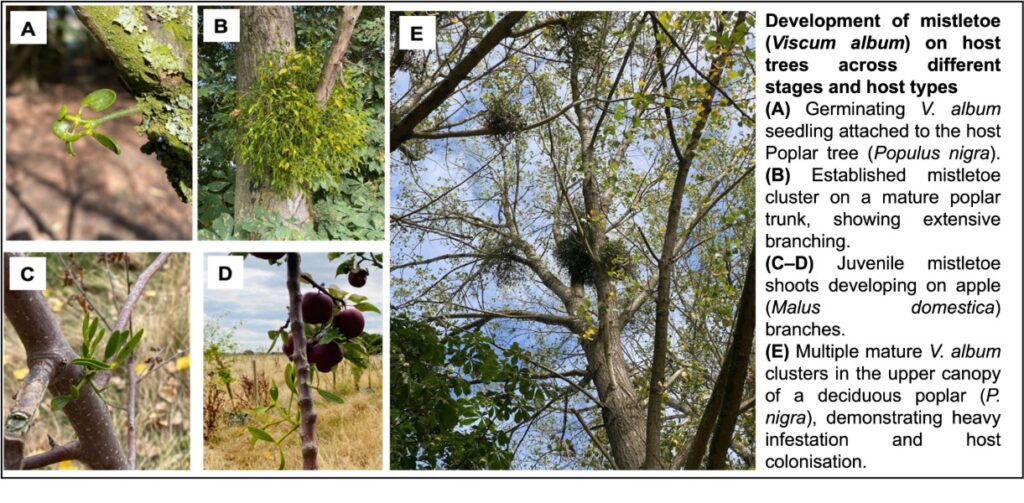Project Description
Supervisors
Dr Pallavi Singh, School of Life Sciences, University of Essex
Dr Nick Aldred, School of Life Sciences, University of Essex
Dr Amanda Cavanagh, School of Life Sciences, University of Essex
Professor Corinne Whitby, School of Life Sciences, University of Essex
Scientific Background
Urban areas are under increasing pressure from air pollution, biodiversity loss and climate stress. Despite the proven benefits of green spaces to the environment, economies and human health and wellbeing, some urban tree-planting initiatives have encountered resistance, as well as practical challenges from slow growth / survival rates of trees, low land availability and high maintenance costs. This pioneering project explores a novel alternative: augmenting existing tree canopies with mistletoe, a hemi-parasite with the potential to enhance removal of pollutants, increase urban biodiversity and improve thermal regulation.

Research Methodology
You will conduct field experiments in urban environments across eastern England and with local partner Mistletoe Trees . These will include measuring particulate matter removal, canopy structure, gas exchange and host tree vitality in mistletoe-enhanced versus unmodified trees. Laboratory simulations and growth experiments will explore mistletoe’s physiological responses to climate stress.
Training
The project provides an exceptional interdisciplinary training platform. You will gain hands-on experience in cutting-edge plant ecophysiology techniques such as chlorophyll fluorescence, gas exchange (using LICOR systems) and thermal imaging, to assess plant performance under environmental stress. Training in geospatial analysis and ecological modelling will enable predictive insight into urban ecosystem dynamics. You will develop expertise in stakeholder engagement, citizen science, and science-policy communication, translating research into actionable outcomes. Supported by ARIES DTP training modules and University of Essex development programmes, you will have further opportunities for placements with local councils and environmental NGOs. This holistic skillset will prepare you for an impactful career in environmental science, urban ecology, policy, or research leadership.
Person Specification
We seek an enthusiastic individual with a background in natural science, life science, plant science, ecology, conservation biology, or agricultural sustainability or related degree. Curiosity, resilience, and an interest in interdisciplinary, impact-driven research are essential. Experience with ecological fieldwork, data analysis (e.g., R or Python), or public engagement is desirable but not required. We welcome applicants who are excited to explore creative, nature-based solutions for the environmental challenges facing cities today.
This innovative project promises to generate tangible societal and environmental benefits while contributing new scientific insights into host–symbiont dynamics in changing climate.
Acceptable first degree subjects: Natural science, life science, plant science, ecology, conservation biology, or agricultural sustainability or related degree
Project code: SINGH_ESSEX_ARIES26
